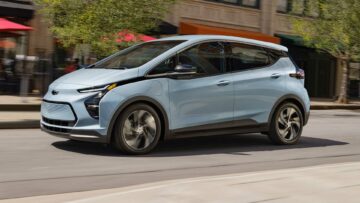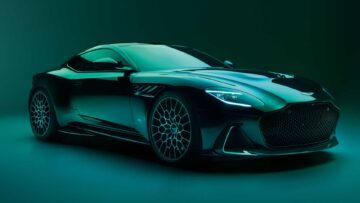Stellantis, the group formed by the merger of Fiat Chrysler Automobiles (FCA) and Peugeot Société Anonyme (PSA) was created to respond to the growing challenges of the global automotive industry.
The set of brands united by the two big houses was better positioned than its rivals in Europe, North America, and South America and, according to the objectives, could easily increase its presence in the Asian markets.
When it was created in January 2021, the Stellantis group was the fourth-largest automaker in the world by units sold, with 6.2 million units in 2020. Sales volume increased to nearly 6.5 million units in 2021 and dropped to 5.84 million units last year. With 14 brands, it was clear that Stellantis had a competitor in mind: the Volkswagen Group.
The European Challenge
The battle between these two giants wasn’t just about volume, it was about profitability as well. The challenge they face is more or less the same: to move from the internal combustion engine sector to the electric car sector, but without affecting profits. While there are issues to address – Volkswagen needs to work on its software and Stellantis needs more models – they have generally managed to maintain their strong positions in their respective markets.
However, a growing gap can be seen in their most important trading area: Europe. According to data on new car registrations provided by JATO for 28 European countries (which, unlike the ACEA, do not include Iceland and Bulgaria), Stellantis is losing ground not only to newcomers such as Tesla and the Chinese brands, but also to VW.
When Stellantis launched over two and a half years ago, its share in the European passenger car market was 21.2 percent. It was just over 4 points less than that held by the Volkswagen Group. Although the new group was the outright leader in Italy and France and had an important position in Spain and other medium-sized markets, its rival still dominated Germany (Europe’s largest car market) the United Kingdom (the second) and was a leader in many central, northern and eastern markets.
The Gap Widens
The gap between the two averaged 4.7 points between January 2021 and June 2022, when VW started growing faster. Since then, the average gap has widened to 8.6 points and continues to grow.
In July 2023, Volkswagen Group recorded the highest monthly market share in two years and surpassed Stellantis by 11.9 points. This is the largest gap between the two groups since the latter was founded and could precede other even higher gaps in the coming months.
Stellantis Needs More Products
As both companies try to catch up with their electric offerings, it is clear that battery-powered cars are selling best in Germany, while the vast majority of European consumers continue to demand petrol-powered cars.
Between January and July this year, Volkswagen Group registered 244,000 new electric cars in Europe, enabling it to lead this important growth sector. Volume increased by 58 percent, thus taking its market share from 21 percent in January-July 2022 to 22.5 percent this year.
The German giant maintained its lead over Tesla, which more than doubled its registrations, but took second place with an 18.7 percent share in the Battery Electric Vehicle (BEV) market. Stellantis, on the other hand, recorded a modest 11 percent increase in BEV registrations, reaching 142,600 units, equal to a 13.2 percent share.
Between those periods it lost 4.3 points of share. While Volkswagen offers eight electric SUVs out of 14 different electric models, Stellantis offers four SUVs out of 24 electric models. Even on the petrol side (which still holds 58 percent of registrations in Europe), the gap is significant: 54 models available (25 SUVs) from VW against 46 (21 SUVs) from Stellantis.
Will the gap continue to grow? Or will Stellantis catch up with more SUVs and fully electric vehicles?
The author of the article, Felipe Munoz, is an Automotive Industry Specialist at JATO Dynamics.
- SEO Powered Content & PR Distribution. Get Amplified Today.
- PlatoData.Network Vertical Generative Ai. Empower Yourself. Access Here.
- PlatoAiStream. Web3 Intelligence. Knowledge Amplified. Access Here.
- PlatoESG. Automotive / EVs, Carbon, CleanTech, Energy, Environment, Solar, Waste Management. Access Here.
- PlatoHealth. Biotech and Clinical Trials Intelligence. Access Here.
- ChartPrime. Elevate your Trading Game with ChartPrime. Access Here.
- BlockOffsets. Modernizing Environmental Offset Ownership. Access Here.
- Source: https://www.motor1.com/news/684816/stellantis-vs-volkswagen-europe/
- :has
- :is
- :not
- $UP
- 000
- 11
- 13
- 14
- 16
- 2020
- 2021
- 2022
- 2023
- 22
- 24
- 25
- 28
- 46
- 54
- 7
- 8
- 84
- 9
- a
- About
- According
- address
- affecting
- against
- ago
- also
- Although
- america
- an
- and
- ARE
- AREA
- article
- AS
- asian
- At
- author
- automobiles
- automotive
- automotive industry
- available
- average
- battery
- Battle
- BE
- BEST
- Better
- between
- Big
- both
- brands
- Bulgaria
- but
- by
- CAN
- car
- cars
- Catch
- central
- challenge
- challenges
- chinese
- chrysler
- clear
- COM
- coming
- Companies
- competitor
- Consumers
- content
- continue
- continues
- could
- countries
- created
- data
- Demand
- different
- do
- doubled
- dropped
- easily
- eastern
- eight
- Electric
- electric car
- electric vehicle
- electric vehicles
- enabling
- Engine
- equal
- Europe
- European
- European Countries
- Even
- Face
- false
- faster
- FCA
- Fiat
- Fiat Chrysler
- For
- formed
- Founded
- four
- France
- from
- fully
- gap
- gaps
- generally
- German
- Germany
- giant
- giants
- Global
- Group
- Group’s
- Grow
- Growing
- Growth
- had
- Half
- hand
- Have
- Held
- higher
- highest
- holds
- houses
- HTTPS
- Iceland
- image
- important
- in
- include
- Increase
- increased
- industry
- internal
- issues
- IT
- Italy
- ITS
- January
- January 2021
- jpg
- July
- june
- just
- Kingdom
- largest
- Last
- Last Year
- launched
- lead
- leader
- less
- losing
- lost
- maintain
- Majority
- managed
- many
- Market
- market share
- Markets
- max-width
- Merger
- million
- mind
- models
- modest
- monthly
- months
- more
- most
- move
- needs
- New
- newcomers
- North
- north america
- numbers
- objectives
- of
- Offerings
- Offers
- on
- only
- or
- Other
- out
- outright
- over
- percent
- periods
- Place
- plato
- Plato Data Intelligence
- PlatoData
- points
- position
- positioned
- positions
- presence
- profits
- provided
- reaching
- recorded
- registered
- respective
- Respond
- Rival
- rivals
- s
- sales
- Sales Volume
- same
- Second
- sector
- seen
- Selling
- set
- Share
- side
- significant
- since
- Software
- sold
- South
- South America
- Spain
- specialist
- started
- Still
- strong
- such
- surpassed
- SUVs
- T
- taking
- Tesla
- than
- that
- The
- the United Kingdom
- the world
- their
- then
- There.
- These
- they
- this
- this year
- those
- Thus
- to
- took
- Trading
- true
- try
- two
- United
- United Kingdom
- units
- unlike
- Vast
- vehicle
- Vehicles
- Versus
- volkswagen
- Volkswagen Group
- volume
- vs
- vw
- was
- wasn
- webp
- WELL
- when
- which
- while
- will
- with
- without
- Work
- world
- year
- years
- zephyrnet













